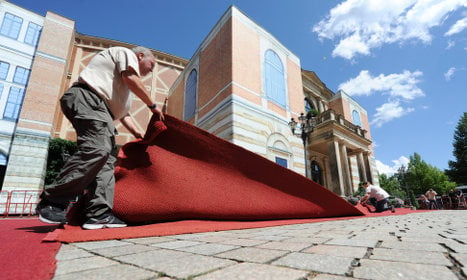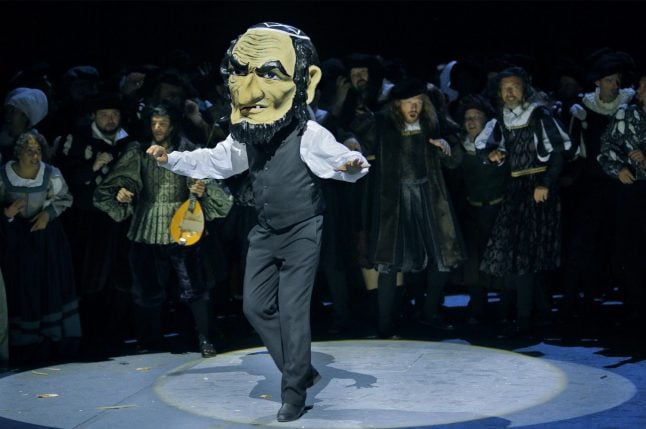The legendary month-long summer festival, dedicated exclusively to the works of composer Richard Wagner, was scheduled to begin at 1500 with an eagerly awaited new production of “Tristan and Isolde” by the composer’s great-granddaughter, Katharina Wagner.
Along with Merkel and her husband Joachim Sauer, regular guests in Bayreuth for many years, a long list of government ministers and regional and local politicians from the southern state of Bavaria were also on the guest list.
Tickets for Bayreuth are still among the hardest to come by in the world of opera and classical music, with the waiting list stretching to as many as 13 or 14 years for some productions, the festival's commercial chief Heinz-Dieter Sense told journalists.
Of the 60,000 tickets on sale this year, around 45,000 were available to the general public, half of them online. The other 15,000 were reserved for the Society of Friends of the festival, one of the main donors.
A lot is at stake this year for 37-year-old Katharina, who has been at the helm of the festival alongside her much older half-sister Eva Wagner-Pasquier since 2009.
Eva, 70, is stepping down at the end of the summer, leaving Katharina in sole charge, at least until her current contract expires in 2020.
It is only the second time that Katharina has directed in Bayreuth’s Festspielhaus — the opera house built to her great-grandfather's own designs after “The Mastersingers of Nuremberg” a few years ago that was heavily panned by audiences and critics alike.
Classical music aficionados also suggest Bayreuth, more generally, could be losing some of its veneer. And Katharina's critics lay the blame squarely at her door.
Under her leadership, the festival's aesthetic preferences have veered towards confrontational directors, such as the self-styled “enfant terrible” of German theatre, Frank Castorf, whose current production of the sprawling four-opera “Ring” cycle has met with deafening waves of boos and whistles since it premiered in 2013.
Dyed-in-the-wool Wagnerians tend to be deeply conservative in their operatic tastes, and seasoned Bayreuthers say they are feeling increasingly alienated by the provocative, in-your-face productions.
Katharina and the conductor of “Tristan and Isolde”, Christian Thielemann, had been scheduled to give a press conference on Friday, but cancelled at the last minute.
In the run-up to the festival, media reports — vigorously dismissed — had claimed that the two had colluded to have Eva Wagner-Pasquier barred from the Green Hill once rehearsals for “Tristan” had started.
More oil was poured on the fire when the current “Ring” conductor, the intensely media-shy Russian Kirill Petrenko, publicly lambasted the way one of his singers — Canadian tenor Lance Ryan, who sang the role of Siegfried in the past two years — was replaced at short notice.
There has been speculation of bitter rivalry between Petrenko and Thielemann after Petrenko was named chief conductor of the Berlin Philharmonic, a position Thielemann was perceived to have coveted for years.
Those rumours were given added piquancy when it was announced that German soprano Anja Kampe, reportedly close to Petrenko, pulled out of the role of Isolde with just four weeks to go before the premiere. Thielemann is conducting the new production.
German soprano Evelyn Herlitzius agreed to take on the role, one of the most demanding in a soprano's repertoire.
But she did not sing during the dress rehearsals to save her voice, organisers said.
Ever since the festival's beginnings in 1876, the composer's descendants have torn each other apart in bitter feuds for control of Bayreuth, whose guests traditionally include royalty and the political and social elite of the day.
Adolf Hitler was a fervent Wagnerian and regularly attended the festival.
In peacetime Germany, many heads of government and state have come.
This year marks the 150th anniversary since “Tristan and Isolde” had its world premiere. Katharina Wagner's will be only the 11th production of the work at the Bayreuth Festival.
But she insisted in a recent interview that she does not let such pressures daunt her.
“I'll never be able to fulfil people's expectations of me if those expectations are super-human,” she told the newspaper Welt am Sonntag.
The Bayreuth Festival runs until August 28 with 30 performances of seven different operas — “Tristan and Isolde”, “Lohengrin”, “The Flying Dutchman” and the “Ring” comprising “Rhinegold”, “The Valkyrie”, “Siegfried” and “Twilight of the Gods”.



 Please whitelist us to continue reading.
Please whitelist us to continue reading.